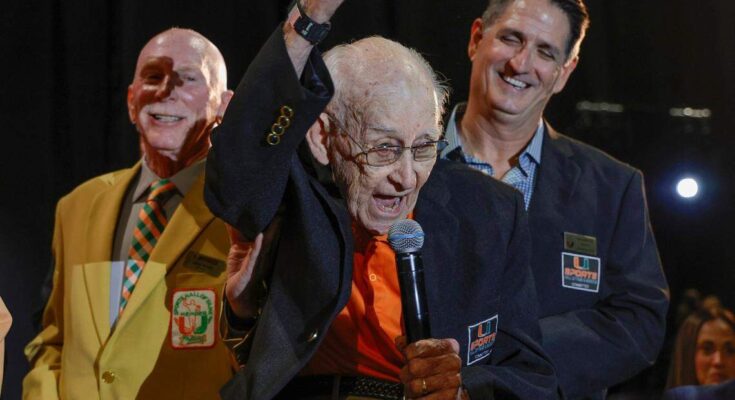We are very grieved by G. Holmes Braddock’s demise. A community leader, lifelong learner, and ardent Miami Hurricanes fan
We are very grieved by G. Holmes Braddock’s demise. A community leader, lifelong learner, and ardent Miami Hurricanes fan, he leaves behind a legacy woven deeply into the fabric of Miami’s educational, civic, and cultural life. His passing is not only a profound loss for those who knew and worked with him but also for the countless individuals whose lives were touched by his vision, leadership, and unwavering belief in the power of education.
G. Holmes Braddock’s name resonates throughout Miami-Dade County, most visibly emblazoned on the high school that bears his name. Yet, the true measure of his impact stretches far beyond any single institution. It resides in the decisions he made as a member and long-serving chairman of the Miami-Dade County School Board, in the initiatives he championed, and in the mentorship and guidance he offered to generations of educators, students, and community activists. His belief in equity, access, and excellence in education was not just theoretical—it was the principle that guided his every action.
For decades, Braddock devoted himself to public service, always with a focus on improving the lives of young people through better educational opportunities. He had a gift for seeing both the big picture and the smallest detail, and he knew how to bring together people from diverse backgrounds to work toward common goals. He believed education was the great equalizer, and he never lost sight of the moral responsibility that comes with holding public office. His integrity, calm demeanor, and capacity to listen made him a respected figure on the board and in the broader community.
One of Braddock’s defining characteristics was his steadfast commitment to inclusivity. He championed desegregation and educational equity at times when those values were still hotly contested. He stood on the right side of history, often at personal and political cost. In an era when school boards were under pressure from multiple sides, he maintained a steady, principled approach, guided by what was best for the children of Miami-Dade County. His long service on the school board, from the 1960s through the 1990s, reflects a period of extraordinary change, and he was instrumental in guiding the district through its most challenging transitions.
Braddock did not view education in isolation from the wider community. He understood that schools were not only places of learning but also hubs of civic life. He worked to ensure that schools were safe, welcoming, and well-resourced. His commitment extended to supporting extracurricular programs, community partnerships, and initiatives that nurtured the whole student—not just academically but socially and emotionally as well. He pushed for schools to serve as a pipeline to college, careers, and responsible citizenship, and he consistently advocated for policies that reflected that comprehensive vision.
While his contributions to education were monumental, G. Holmes Braddock’s influence extended into other facets of civic life. He was a unifier—a person who could bridge divides and bring together people with differing viewpoints. In doing so, he embodied a form of leadership that is increasingly rare: humble, principled, and persistent. He believed that public institutions should serve the public good, and he was never distracted by personal ambition or partisan concerns. This clarity of purpose gave strength to the causes he supported and earned him the trust of colleagues and constituents alike.
At the same time, Braddock was deeply human. He had a warmth that made people feel seen and heard. He had the ability to sit down with a parent or student and really listen, to offer advice or encouragement that came from experience and heart. His compassion was never performative—it was rooted in a genuine respect for people from all walks of life. He was the kind of leader who showed up, who made time, who followed through. In both quiet gestures and public decisions, he demonstrated a consistent care for the community he loved.
Lifelong learning was not merely a philosophy for Braddock—it was a practice. Even after leaving public office, he remained active in educational circles, always reading, asking questions, and engaging in thoughtful dialogue. He believed that education was not a finite journey but an ongoing process of growth and discovery. This belief shaped his own life and inspired those around him to never stop learning, questioning, or striving to do better. His conversations were often laced with insights from history, literature, or current affairs, and he took genuine pleasure in intellectual exchange.
Braddock also had a more spirited side—one most evident in his unwavering fandom for the Miami Hurricanes. Whether it was football, basketball, or any other sport where “The U” was competing, he was a constant supporter, full of pride and passion. For him, cheering for the Hurricanes wasn’t just about sports; it was about community, identity, and belonging. He saw in the team’s grit and determination a reflection of the values he admired. The thrill of victory, the camaraderie of fans, the shared history—it all resonated deeply with him. His loyalty to the Hurricanes was emblematic of the loyalty he extended in all aspects of his life.
The grief we feel at his passing is matched only by our gratitude for the life he led. In remembering G. Holmes Braddock, we remember a man who never stopped working for the betterment of others, who lived his values with quiet dignity, and who left every place he touched better than he found it. He was not loud, not flashy, not seeking accolades—but he was tireless, wise, and wholly dedicated. His contributions live on not only in policies and buildings but in the aspirations of every student who dares to dream big because of the doors he helped open.
It is rare to find someone whose life is so inextricably tied to the progress of a community. Yet in Braddock’s case, his fingerprints are on decades of change—on desegregation, on school reform, on civic leadership. That kind of impact doesn’t fade. It continues to echo in classrooms and boardrooms, in the hearts of teachers and students, in the hopes of every parent who wishes for a better future for their child. It continues in the very idea that public service, when done with integrity and love, can uplift entire generations.
We mourn him not just for what we have lost, but for who he was: a man of substance, humility, and quiet strength. As we reflect on his legacy, we are called to remember the values he lived by—to carry them forward, to apply them in our own spheres of influence, however large or small. His life reminds us that leadership is not about power but about purpose, and that the most lasting change often comes not from grand gestures but from sustained, principled action over time.
Our hearts go out to his family, who shared him with the broader community for so many years. We recognize the sacrifices they made so that he could serve, and we offer them our deepest sympathies and most profound respect. Their grief is shared by thousands who were impacted by his life’s work and who now feel his absence keenly.
In time, buildings may weather, and names may fade from memory. But the spirit with which G. Holmes Braddock served—his fierce commitment to justice, his love of learning, his devotion to youth and community—those are eternal. They are written not in stone but in lives changed, opportunities created, and a better Miami-Dade made possible by his vision. As we say goodbye, we do so not with despair but with a sense of sacred duty: to continue the work he began, to lead with heart, and to honor his memory by building a future as inclusive, courageous, and hopeful as the one he believed in.
Rest in peace, G. Holmes Braddock. You were one of the great ones. Your light continues to shine.



